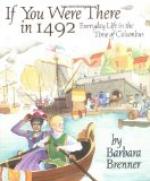Some idea of the difficulties which had to be encountered at this period may be conceived from an account of the state of his colony which Columbus sent home in January 1494. It is in the form of instructions to a certain Antonio de Torres, the Receiver of the Colony, who was to proceed to the court of Spain and inform the Monarchs of such things as were written in these instructions, and doubtless to elucidate them by discourse, as in the present day we send a despatch to be read by an ambassador to the foreign minister of the power we are treating with. There remains a copy, made at the time, of this document, and of the notes in the margin containing the resolutions of the sovereigns. The original, thus noted, was taken back to Columbus. It is a most valuable document, very illustrative of the cautious and wise dealing of the catholic sovereigns.
The document begins with the usual strain of complimentary address to great personages, “Their Highnesses hold it for good service” is the marginal remark.
The next paragraph consists of a general statement of the discoveries that have been made. “Their Highnesses give much thanks to God, and hold as very honoured service all that the admiral has done.”
Then follow the admiral’s reasons why he has not been able to send home more gold. His people have been ill: it was necessary to keep guard, &c. “He has done well” is in the margin.
He suggests the building of a fortress near the place where gold can be got. Their Highnesses approve; and the note in the margin is, “This is well, and so it must be done.”
Then comes a paragraph about provisions, and a marginal order from the sovereigns, “that Juan de Fonseca is to provide for that matter.”
Again, there comes another paragraph about provisions, complaining, amongst other things, that the casks, in which the wine for the armada had been put, were leaky. Their Highnesses make an order in the margin, “that Juan de Fonseca is to find out the persons who played this cheat with the wine casks, and to make good from their pockets the loss, and to see that the canes” (sugar canes for planting, possibly) “are good, and that all that is here asked for, be provided immediately.”
Castilian interpreters.
So far, nothing can run more pleasantly with the main document than the notes in the margin. Columbus now touches upon a matter which intimately concerns the subject of slavery. He desires his agent to inform their Highnesses that he has sent home some Indians from the Cannibal Islands as slaves, to be taught Castilian, and to serve afterwards as interpreters, so that the work of conversion may go on. His arguments in support of this proceeding are weighty. He speaks of the good that it will be to take these people away from cannibalism and to have them baptized, for so they will gain their souls, as he expresses it. Then, too, with regard to the other Indians,




